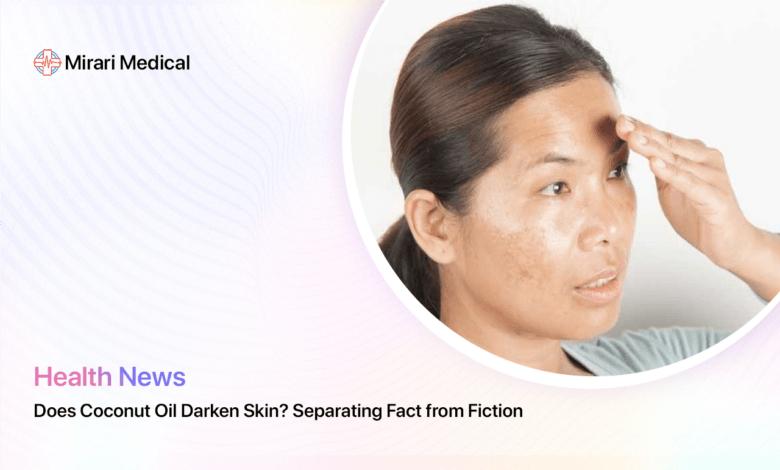Does Coconut Oil Darken Skin? Separating Fact from Fiction

Coconut oil has gained popularity as a natural skincare ingredient, touted for its moisturizing and nourishing properties. However, some users have raised concerns about whether coconut oil can darken the skin. This comprehensive guide explores the available evidence, individual variations, and safe alternatives for your skincare routine, helping you make informed decisions about incorporating coconut oil into your beauty regimen.
Unveiling the Truth: Limited Science Behind Coconut Oil and Skin Darkening
When it comes to the claim that coconut oil darkens skin, it’s crucial to distinguish between anecdotal reports and scientific evidence. While some people may report experiencing a darkening of their skin after using coconut oil, there is limited scientific research to definitively confirm this effect.
“While some people report darkening of their skin after using coconut oil, there is limited scientific evidence to definitively confirm this effect.”
It’s important to approach anecdotal evidence with a critical eye and prioritize well-designed studies when seeking answers about skincare ingredients and their potential effects.
The Need for Further Research
To gain a clearer understanding of how coconut oil may impact skin pigmentation, more targeted studies are necessary. Researchers would need to design controlled experiments that compare the effects of coconut oil to other skincare ingredients, while accounting for individual variations in skin type and sensitivity.
Until such studies are conducted and provide conclusive evidence, it’s essential to approach claims about coconut oil and skin darkening with caution. Relying on personal experiences alone may not paint a complete picture, as individual results can vary significantly.
Understanding Skin Darkening: The Role of Melanin
To better understand how coconut oil might potentially influence skin color, it’s helpful to have a basic understanding of the factors that contribute to skin pigmentation. The primary determinant of skin color is a pigment called melanin, which is produced by cells known as melanocytes.
Melanin Production and Pigmentation
Melanin production is influenced by a variety of factors, including genetics, hormones, and exposure to ultraviolet (UV) radiation from the sun. When skin is exposed to UV light, melanocytes increase melanin production as a protective mechanism against damage. This increased melanin can result in skin darkening or tanning.
While some skincare ingredients may have the potential to stimulate melanin production, the effects are often subtle and can vary greatly from person to person. It’s important to note that the primary factor in skin darkening remains sun exposure, rather than topical skincare products alone.
Protecting Your Skin from Sun Damage
Given the significant role of sun exposure in skin pigmentation, it’s crucial to prioritize sun protection in your skincare routine. Regularly using a broad-spectrum sunscreen with an SPF of at least 30 can help shield your skin from harmful UV rays and minimize the risk of sun-induced skin darkening.
Remember, while the potential effects of coconut oil on skin pigmentation remain uncertain, the importance of sun protection is well-established. Incorporating daily sunscreen use into your routine is a proven way to maintain even skin tone and prevent premature aging.
Can Coconut Oil Indirectly Contribute to Darkening? Exploring Possibilities
Although the direct link between coconut oil and skin darkening lacks conclusive scientific evidence, there are some potential indirect ways in which coconut oil might contribute to changes in skin pigmentation. Let’s explore a few possibilities:
Potential for Increased Melanin Production
Some research suggests that certain fatty acids found in coconut oil, such as lauric acid, may have the potential to stimulate melanin production. However, it’s important to note that these studies are limited and often conducted in vitro (in a lab setting) rather than on human skin.
The potential for coconut oil to increase melanin production remains a topic of debate, and more research is needed to understand the extent and significance of this effect on actual skin pigmentation.
Skin Type Matters
Another factor to consider is that coconut oil may affect different skin types differently. Those with oily or sensitive skin may be more prone to adverse reactions when using coconut oil, including potential changes in skin color.
Coconut oil has a high comedogenic rating, meaning it can clog pores and lead to breakouts in some individuals. If you have acne-prone skin, using coconut oil may exacerbate your symptoms and potentially contribute to post-inflammatory hyperpigmentation (dark spots left behind after a blemish heals).
It’s crucial to pay attention to how your skin reacts to coconut oil and discontinue use if you notice any negative effects, such as increased oiliness, breakouts, or darkening of the skin.
Individual Variations: Why Coconut Oil Might Affect You Differently
One of the challenges in determining the impact of coconut oil on skin pigmentation is the wide range of individual variations in skin sensitivity and response to skincare ingredients. What works well for one person may not yield the same results for another.
Melanin Production and Sensitivity
Factors such as genetics, hormones, and overall skin health can influence how readily your skin produces melanin in response to various stimuli, including skincare ingredients like coconut oil. Some people may be more prone to hyperpigmentation or have more reactive skin, making them more susceptible to changes in skin color.
It’s essential to listen to your skin and observe how it reacts to different products. If you notice any unusual darkening or uneven pigmentation after using coconut oil, it may be a sign that your skin is sensitive to this ingredient.
Underlying Skin Conditions
Another important consideration is the presence of underlying skin conditions that may interact with coconut oil and affect pigmentation. For example, if you have a pre-existing condition like melasma (a common skin disorder that causes dark patches on the face), using coconut oil may potentially worsen the appearance of these patches.
Similarly, if you have a history of post-inflammatory hyperpigmentation or are prone to developing dark spots after breakouts or skin injuries, coconut oil’s comedogenic properties may increase your risk of experiencing these pigmentation issues.
If you have any pre-existing skin conditions or concerns, it’s always best to consult with a dermatologist before incorporating new ingredients like coconut oil into your skincare routine. They can provide personalized guidance based on your unique skin type and needs.
Safety First: Patch Testing Before Applying Coconut Oil
Before using coconut oil or any new skincare ingredient on your face or body, it’s crucial to conduct a patch test to assess your skin’s sensitivity and rule out any potential allergic reactions. Patch testing is a simple and effective way to minimize the risk of adverse effects and ensure that a product is safe for your skin.
Why Patch Testing is Important
Patch testing helps you identify any potential allergic reactions or sensitivities to a new skincare ingredient before applying it to a larger area of your skin. Even natural ingredients like coconut oil can cause irritation or allergic reactions in some individuals, so it’s essential to err on the side of caution.
By conducting a patch test, you can avoid the discomfort and potential complications associated with a full-face reaction, such as redness, itching, or swelling. It’s a simple step that can save you from unnecessary skin distress.
How to Conduct a Patch Test
To perform a patch test with coconut oil, follow these steps:
- Choose a small area of skin, such as the inside of your forearm or behind your ear.
- Apply a small amount of coconut oil to the selected area and cover it with a bandage.
- Leave the patch test in place for 24-48 hours, monitoring the area for any signs of redness, itching, or irritation.
- If no adverse reactions occur after the allotted time, you can proceed with using coconut oil on a larger area of your skin.
If you do experience any negative reactions during the patch test, discontinue use immediately and cleanse the area with mild soap and water. If symptoms persist or worsen, consult with a healthcare professional for guidance.
Remember, patch testing is a crucial step in ensuring the safety and compatibility of any new skincare ingredient, including coconut oil. Taking the time to assess your skin’s response can help you avoid potential discomfort and maintain the health and integrity of your skin.
Beyond Coconut Oil Darkening: Potential Risks and Drawbacks
While the potential for coconut oil to darken skin remains a topic of debate, it’s important to consider other potential risks and drawbacks associated with using this ingredient in your skincare routine. Let’s explore a few key concerns:
Comedogenic Rating and Clogged Pores
One of the most significant drawbacks of coconut oil is its high comedogenic rating. Comedogenic ingredients are those that are more likely to clog pores and contribute to the development of acne and blackheads. Coconut oil has a comedogenic rating of 4 out of 5, indicating that it has a high likelihood of clogging pores.
If you have acne-prone or oily skin, it’s essential to be cautious when using coconut oil on your face. The high comedogenic rating means that coconut oil can exacerbate existing acne and contribute to the formation of new blemishes, leading to a more uneven skin tone and potential hyperpigmentation.
If you’re struggling with acne or have naturally oily skin, it may be best to avoid using coconut oil on your face altogether. Instead, opt for non-comedogenic oils like jojoba oil or grapeseed oil, which are less likely to clog pores and cause breakouts.
Allergic Reactions and Sensitivity
Another potential risk associated with coconut oil is the possibility of allergic reactions or sensitivity. While coconut oil is generally well-tolerated by most people, some individuals may experience adverse reactions, such as redness, itching, or swelling.
If you have sensitive skin or a history of allergies, it’s crucial to perform a patch test before applying coconut oil to larger areas of your skin. By testing a small amount of the oil on a discrete area and monitoring for any negative reactions, you can minimize the risk of a more widespread allergic response.
If you do experience any signs of an allergic reaction or sensitivity to coconut oil, discontinue use immediately and consult with a healthcare professional if symptoms persist or worsen.
Safe Alternatives to Coconut Oil: Finding the Right Fit for Your Skin
If you’re concerned about the potential risks associated with coconut oil or have experienced negative effects on your skin, there are several safe alternatives that can provide similar benefits without the drawbacks. Let’s explore a few options:
Jojoba Oil: A Non-Comedogenic Moisturizer
Jojoba oil is a popular alternative to coconut oil, as it closely mimics the natural oils produced by our skin. This similarity makes jojoba oil an excellent moisturizer that is less likely to clog pores or cause breakouts.
Jojoba oil is non-comedogenic, meaning it has a low risk of contributing to acne or blackheads. It’s also rich in vitamins and minerals that can nourish and protect the skin, making it a suitable choice for most skin types, including oily and acne-prone skin.
Grapeseed Oil: Lightweight and Antioxidant-Rich
Grapeseed oil is another lightweight, non-comedogenic option that can provide moisture without leaving a greasy residue on the skin. It’s particularly beneficial for oily skin types, as it helps regulate sebum production and minimizes the appearance of enlarged pores.
In addition to its moisturizing properties, grapeseed oil is rich in antioxidants like vitamin E, which can help protect the skin from free radical damage and promote a more even skin tone. It’s also easily absorbed by the skin, making it an excellent carrier oil for other skincare ingredients.
Rosehip Oil: Brightening and Nourishing
Rosehip oil, derived from the seeds of rose bushes, is a potent source of vitamins A and C, essential fatty acids, and antioxidants. These nutrients work together to brighten the skin, reduce the appearance of fine lines and wrinkles, and promote a healthy, radiant complexion.
Rosehip oil is known for its ability to even out skin tone and fade the appearance of dark spots and hyperpigmentation. It’s also a non-comedogenic oil, making it suitable for most skin types, including oily and acne-prone skin.
Consulting a Dermatologist for Personalized Recommendations
While these alternative oils can be excellent options for many people, it’s important to remember that individual skin needs can vary greatly. What works well for one person may not be the best choice for another.
If you have specific skin concerns or are unsure about which oil is right for you, consulting with a dermatologist can provide valuable guidance. A dermatologist can assess your skin type, consider any underlying conditions, and recommend safe and effective skincare ingredients tailored to your unique needs.
By working with a skincare professional, you can develop a personalized routine that addresses your concerns while minimizing the risk of adverse reactions or unintended consequences, such as skin darkening or irritation.
Navigating Conflicting Information: When to Trust the Experts
In the world of skincare, it’s not uncommon to encounter conflicting information and anecdotal reports about the effects of various ingredients, including coconut oil. With so many sources claiming different results, it can be challenging to know whom to trust and how to make informed decisions about your skincare routine.
The Importance of Consulting a Dermatologist
When faced with conflicting information or concerns about the safety and efficacy of a skincare ingredient, it’s always best to consult with a dermatologist. As medical professionals specializing in the care and treatment of skin, dermatologists have the expertise and knowledge to provide reliable, evidence-based guidance.
A dermatologist can help you navigate the often-confusing landscape of skincare products and ingredients, separating fact from fiction and offering personalized recommendations based on your unique skin type and concerns. They can also monitor your skin’s response to new products and make adjustments as needed to ensure the best possible results.
Dermatologist Expertise: Guidance on Safe and Effective Skin Lightening Methods
If you’re interested in achieving a more even skin tone or addressing concerns about hyperpigmentation, a dermatologist can provide valuable guidance on safe and effective skin lightening methods. While some natural ingredients, like coconut oil, may claim to have skin lightening properties, the evidence supporting these claims is often limited or anecdotal.
A dermatologist can recommend proven treatments and products that are tailored to your specific needs and goals. They can also help you understand the potential risks and benefits associated with various skin lightening methods, ensuring that you make informed decisions about your skincare routine.
By working closely with a dermatologist, you can develop a safe and effective plan for achieving your desired skin tone while minimizing the risk of adverse reactions or unintended consequences. Remember, when it comes to the health and appearance of your skin, it’s always best to trust the experts and prioritize evidence-based approaches.
FAQs
I’ve heard coconut oil can tan your skin. Is this true?
There is limited scientific evidence to support the claim that coconut oil can tan your skin. While some people may report a darker skin tone after using coconut oil, this effect is more likely due to individual variations in skin sensitivity and melanin production rather than a direct tanning effect of the oil itself.
After using coconut oil, my skin looks darker. Should I be worried?
If you notice a darkening of your skin after using coconut oil, it’s important to consider several factors, such as your skin type, the quality of the oil, and the presence of any underlying skin conditions. While some individuals may experience a temporary darkening of the skin, this effect is not typically cause for concern.
However, if the darkening persists or is accompanied by other symptoms, such as redness, itching, or irritation, it’s best to discontinue use and consult with a dermatologist. They can help determine the underlying cause and recommend appropriate treatment options.
Are there any safe alternatives to coconut oil for sensitive skin?
Yes, there are several safe alternatives to coconut oil that may be better suited for sensitive skin. Some options include:
- Jojoba oil: A non-comedogenic oil that closely mimics the skin’s natural oils
- Grapeseed oil: A lightweight, easily absorbed oil that is rich in antioxidants
- Rosehip oil: A nourishing oil that can help even out skin tone and reduce the appearance of hyperpigmentation
It’s important to patch test any new oil before applying it to larger areas of the skin to ensure compatibility and minimize the risk of adverse reactions.
Can coconut oil help lighten existing dark spots on my skin?
While some people may claim that coconut oil can help lighten dark spots or hyperpigmentation, there is limited scientific evidence to support this claim. Coconut oil’s potential skin lightening effects are more likely due to its moisturizing properties, which can help improve overall skin health and appearance.
If you’re concerned about dark spots or uneven skin tone, it’s best to consult with a dermatologist. They can recommend safe and effective treatments, such as topical medications, chemical peels, or laser therapy, depending on your specific needs and goals.
I want to achieve a more even skin tone. What can I do besides using coconut oil?
If you’re looking to achieve a more even skin tone, there are several steps you can take in addition to, or instead of, using coconut oil:
- Protect your skin from the sun: Use a broad-spectrum sunscreen with an SPF of at least 30 daily to prevent further hyperpigmentation and promote a more even skin tone.
- Incorporate vitamin C: Topical vitamin C serums can help brighten the skin and reduce the appearance of dark spots over time.
- Consider retinoids: Retinol-A derivatives, such as tretinoin or adapalene, can help improve skin texture, reduce the appearance of dark spots, and promote cell turnover for a more even complexion.
-
Try chemical exfoliants: Alpha-hydroxy acids (AHAs) and beta-hydroxy acids (BHAs) can help exfoliate the skin, removing dead skin cells and promoting a brighter, more even skin tone.
-
Consult with a dermatologist: For personalized advice and targeted treatments, consult with a dermatologist who can assess your skin and recommend the most effective approach for achieving a more even skin tone.
Remember, consistency and patience are key when working towards a more even complexion. Stick with your skincare routine, protect your skin from the sun, and give your skin time to respond to the changes you’ve implemented.
Key Takeaways
- While some people report darkening of their skin after using coconut oil, there is limited scientific evidence to definitively confirm this effect.
- Skin darkening is primarily influenced by melanin production, which is largely determined by genetics and sun exposure.
- Coconut oil may indirectly contribute to skin darkening in some individuals, but the evidence is limited and results can vary greatly.
- Patch testing is crucial before applying coconut oil to larger areas of the skin to minimize the risk of adverse reactions.
- Coconut oil has a high comedogenic rating and may clog pores, particularly in those with oily or acne-prone skin.
- Safe alternatives to coconut oil include jojoba oil, grapeseed oil, and rosehip oil, depending on your skin type and specific needs.
- Consulting with a dermatologist can provide personalized guidance on safe and effective methods for achieving a more even skin tone.
In conclusion, while coconut oil is a popular natural skincare ingredient, its potential to darken the skin remains a topic of debate. Limited scientific evidence and individual variations in skin sensitivity and response make it difficult to draw definitive conclusions. By understanding the factors that influence skin pigmentation, practicing safe skincare habits, and seeking professional advice when needed, you can make informed decisions about incorporating coconut oil or alternative ingredients into your skincare routine. Remember, the key to healthy, radiant skin is a personalized approach that prioritizes your unique needs and goals.
Your trusted source for health info, offering expert advice, news, and tips to stay healthy and informed.





